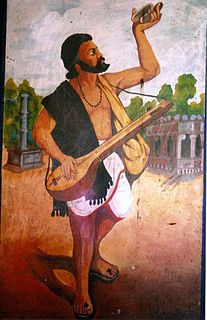
Sir Monier Monier-Williams, KCIE was the second Boden Professor of Sanskrit at Oxford University, England. He studied, documented and taught Asian languages, especially Sanskrit, Persian and Hindustani.
Joshi is a surname used by the Brahmins (caste) in India and Nepal. In Nepal, the surname Joshi is also used by Newars (caste). Joshi is also sometimes spelled as Jyoshi. The name is popularly derived from the Sanskrit word Jyotisha, referring to Vedic Astrology and astronomy; in turn, Jyotisha is derived from Jyotish. Joshi is a common family name in the Indian states of Delhi, Gujarat, Karnataka, Madhya Pradesh, Maharashtra, Odisha, Punjab, Rajasthan, Uttarakhand, Goa and Uttar Pradesh. In Nepal, it is adopted by two different ethnic groups, the Kumai (Khas) Bahun and the Chatharīya (Kshatriya) Newars.
Suresh is an Indian masculine given name originating in the Sanskrit word sureśa. Its meaning is "Ruler of Gods" and it has been used an epithet for the Hindu gods Indra, Bhrama, Vishnu and Shiva.
Akhil is an Indian masculine given name. The meaning of the Sanskrit word akhila is "complete", "whole". The equivalent feminine name is Akhilā.
Shreya is an Indian and Persian girls name and also has an Arabian background from “Sharia” meaning lattice. The word Shreya has several meanings which include "precious", "most beautiful. The name has a Zoroastrian background as well as Shreya is an Avestan word meaning prosperous.
Anupama is a Hindu feminine given name. In Sanskrit, it means "incomparable", or "excellent".
Rucha or Richa refers to a shloka (couplet) or mantra, usually two to four sentences long, found in the Sanskrit religious scriptures, the Vedas. The etymological origin of rucha is the Sanskrit word, ruc (ऋच्), which means to praise. Rucha, is therefore, one ruc after the other. Other meanings of ruc are splendour, worship, a hymn. Rucha can also refer to a verbal composition of celestial sounds called "shrutis"; the Gayatri Mantra is a rucha as well. Rucha means "aphorism of Rig Veda".
Kiran is a unisexual given name. It originates in the Sanskrit word kiraṇa, meaning "ray" or "ray of light" or "beam of light". Other names that sound like Kiran are Kira, Kirwan, Ciaran, Keiran and Kieran.
Anirban or Anirvan is an Indian masculine given name. It is mostly used in the Bengali and Assamese languages. The meaning of the Sanskrit word anirvāṇa is "the fire that never stops" or "unextinguished". Notable people with this name include:
Amita is a female name of Indian, Hebrew and Italian origin. The name means "infinite, boundless" in Sanskrit, and "truth" in Hebrew.
Shweta is a Hindu/Sanskrit Indian feminine given name, which means "fair", "fair one", "lovely", "pure" and "white". Also means "beauty", "intelligence" and "stylish". Shweta originates from the Sanskrit language. It signifies the Hindu goddess of knowledge, education and intellect, Saraswati. Saraswati is also known as "Shwetambara". Also, "Shwet" means white in Sanskrit, which signifies purity.
Anup or Anoop is an Indian masculine given name. The Sanskrit word anūpa has the following meanings: 'watery', 'situated near the water', 'bank of a river', 'pond', 'lagoon'.The meaning of the name “Anoop” is: "Incomparable, unequalled; unique; pond.
Akhila is a Hindu/Sanskrit Indian feminine given name, which means "whole" or "complete". Notable persons with the name include:
Uma is a given name in various cultures.
Abhinav is an Indian name. The Sanskrit word abhinav has the meanings "very young", "quite new", "unique", "clever", "bright". Notable people with the name include:
Arjun is an Indian male given name, based on Arjuna, a legendary hero who is a best archer in central character of the Hindu epic Mahabharata. Arjuna had four other brothers, who were Yudhishthira, Bhima, Nakula, Sahadeva, and Karna.
Upendra is an Indian masculine given name. The meaning of the Sanskrit word upendra is "younger brother of Indra" and refers to either Krishna or Vishnu, who as a son of Aditi was born subsequently to Indra.
Apoorva or Apurva is the common English spelling of two related Indian given names: the feminine अपूर्वा apūrvā and the masculine अपूर्व apūrva. The masculine name is often spelled Apurv or Apoorv, as in many modern Indo-Aryan languages it is pronounced without the vowel at the end, for example in Hindi:. In Sanskrit apūrva and apūrvā are respectively the masculine and feminine forms of the adjective meaning 'unprecedented', 'new', 'extraordinary'.
Aniket is an Indian masculine given name. The meaning of the Sanskrit word aniketa- is "houseless".


